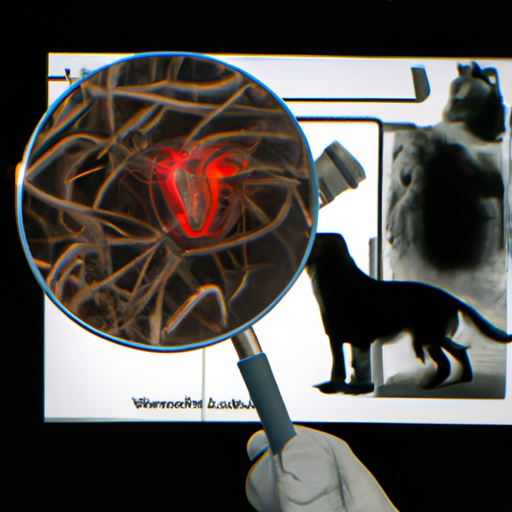Introduction
You, as a dog owner, play the role of a caregiver. You must be familiar with the threats that loom over your canine companion. One such danger is heartworms.
Heartworm disease is a severe and potentially fatal condition caused by parasitic worms living in the arteries of the lungs and occasionally in the heart. It’s a concern for every dog parent, and it’s crucial to understand how to protect your beloved pet.
Understanding Heartworms
Heartworms are long, spaghetti-like parasites that live in the heart or large vessels of the lungs in infected dogs. They can grow up to a foot long and cause significant damage to your dog’s heart, lungs, and blood vessels.
Here is a simple table to illustrate the lifecycle of heartworms:
| Step | Description |
|---|---|
| 1 | Heartworms start as tiny larvae that are transferred to dogs by mosquitoes. |
| 2 | The larvae mature into adults in the dog’s body. |
| 3 | Adult heartworms produce offspring, which circulate in the bloodstream. |
| 4 | A mosquito bites the infected dog, taking in the offspring, which then mature into larvae. |
| 5 | The mosquito transfers the larvae to the next dog it bites, starting the cycle again. |
Symptoms of Heartworm Disease
Your dog may not show any signs of heartworm infection in the early stages. As the worms multiply and grow, symptoms may start to appear. Be on the lookout for:
- A mild persistent cough
- Reluctance to exercise or play
- Fatigue after moderate activity
- Decreased appetite
- Weight loss
If left untreated, heartworm disease can lead to heart failure and damage to other organs, leading to death.
Preventing Heartworm Disease
Prevention is always better than cure, and this is particularly true when it comes to heartworm disease. Here are some steps you can take:
- Regular Vet Check-ups: Regular visits to the vet can ensure early detection and treatment of heartworms.
- Heartworm Preventatives: Administer heartworm preventatives as advised by your vet. They come in the form of tablets, topicals, and injectables.
- Maintain a Mosquito-Free Environment: Since heartworms are transmitted by mosquitoes, make sure your home and surroundings are mosquito-free.
Treating Heartworm Disease
The treatment for heartworm disease can be costly and complex, involving several stages. It includes:
- An initial health assessment to determine the severity of the infection
- The use of drugs to kill adult heartworms
- Additional treatments to kill larvae in the bloodstream
- Post-treatment care to ensure complete recovery
Remember, the goal of treatment is not just to kill the heartworms but also to do so without harming your dog.
Frequently Asked Questions (FAQs)
Q: Can humans get heartworms from dogs?
A: It’s extremely rare. Heartworms primarily affect animals like dogs and cats.
Q: Is heartworm disease contagious?
A: No, heartworms cannot be directly transmitted from one dog to another. They are spread through mosquitoes.
Q: Can heartworm disease be prevented?
A: Yes, preventative medications are available and should be administered as directed by your vet.
Q: Is there a specific season for heartworms?
A: While mosquitoes are more common in warmer months, year-round prevention is recommended since weather can be unpredictable.
By understanding heartworm disease, you can take steps to prevent it and ensure your furry friend lives a long, healthy life. Remember, you are not just a pet owner, but a caregiver. Your dog’s health is in your hands.



